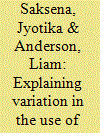| Srl | Item |
| 1 |
ID:
082349


|
|
|
|
|
| Publication |
2008.
|
| Summary/Abstract |
Despite the much-touted celebration of the successes of the General Agreement on Tariffs and Trade/World Trade Organization in liberalizing free trade, these successes have been limited due to the increasing use of non-tariff barriers (NTBs) as a form of 'protectionism in disguise.' Among advanced industrial economies, the use of NTBs varies considerably. The purpose of this paper is to explain what accounts for this variation. We locate the issue of international trade in its appropriate theoretical context - as a two-level game in which politicians simultaneously face pressure at the international level to fulfill commitments to international free trade agreements, and domestic pressures for protectionist relief. We conduct a statistical analysis using a simple, multivariate regression model examining data at three points in time, 1988, 1993, and1996, to highlight the causes of the rise in NTBs and variation in their usage. We hypothesize that PR-based systems are associated with lower rather than higher levels of NTBs
|
|
|
|
|
|
|
|
|
|
|
|
|
|
|
|
| 2 |
ID:
075064


|
|
|
|
|
| Publication |
2006.
|
| Summary/Abstract |
This paper argues that it was the flawed design of the Comprehensive Test Ban Treaty (CTBT) rather than the conventionally ascribed reasons of security, international status, or domestic imperatives that provided the necessary incentive for India to conduct nuclear tests in 1998 before the treaty foreclosed such an option altogether. The mandatory nature of the entry-into-force (EIF) clause of the CTBT was a departure from other international agreements in that membership was not voluntary. This suggests that any regime that impinges on a state's sovereign right to make security decisions on behalf of its people is likely to meet failure by formal or informal defections.
|
|
|
|
|
|
|
|
|
|
|
|
|
|
|
|